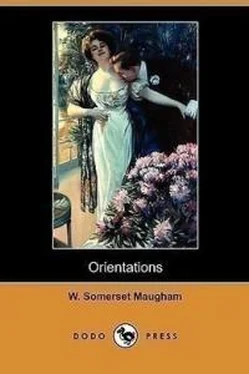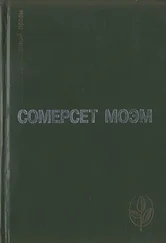Уильям Моэм - Orientations
Здесь есть возможность читать онлайн «Уильям Моэм - Orientations» весь текст электронной книги совершенно бесплатно (целиком полную версию без сокращений). В некоторых случаях можно слушать аудио, скачать через торрент в формате fb2 и присутствует краткое содержание. Год выпуска: 2014, Издательство: epubBooks Classics, Жанр: Классическая проза, на английском языке. Описание произведения, (предисловие) а так же отзывы посетителей доступны на портале библиотеки ЛибКат.
- Название:Orientations
- Автор:
- Издательство:epubBooks Classics
- Жанр:
- Год:2014
- ISBN:нет данных
- Рейтинг книги:5 / 5. Голосов: 1
-
Избранное:Добавить в избранное
- Отзывы:
-
Ваша оценка:
- 100
- 1
- 2
- 3
- 4
- 5
Orientations: краткое содержание, описание и аннотация
Предлагаем к чтению аннотацию, описание, краткое содержание или предисловие (зависит от того, что написал сам автор книги «Orientations»). Если вы не нашли необходимую информацию о книге — напишите в комментариях, мы постараемся отыскать её.
Orientations — читать онлайн бесплатно полную книгу (весь текст) целиком
Ниже представлен текст книги, разбитый по страницам. Система сохранения места последней прочитанной страницы, позволяет с удобством читать онлайн бесплатно книгу «Orientations», без необходимости каждый раз заново искать на чём Вы остановились. Поставьте закладку, и сможете в любой момент перейти на страницу, на которой закончили чтение.
Интервал:
Закладка:
'I reckon this about takes the shine out of Paris.'
They had agreed to start work at once, losing no time, for they wanted to have a lot to show on their return to France, that their scheme might justify itself. Ferdinand wished to accompany Valentia on her search for the picturesque, but she would not let him; so, after breakfast, he sat himself down in the summer–house, and spread out all round him his nice white paper, lit his pipe, cut his quills, and proceeded to the evolution of a masterpiece. Valentia tied the red strings of her sun–bonnet under her chin, selected a sketchbook, and sallied forth.
At luncheon they met, and Valentia told of a little bit of canal, with an old windmill on one side of it, which she had decided to paint, while Ferdinand announced that he had settled on the names of his dramatis personæ . In the afternoon they returned to their work, and at night, tired with the previous day's travelling, went to bed soon after dinner.
So passed the second day; and the third day, and the fourth; till the end of the week came, and they had worked diligently. They were both of them rather surprised at the ease with which they became accustomed to their life.
'How absurd all this fuss is,' said Valentia, 'that people make about the differences of the sexes! I am sure it is only habit.'
'We have ourselves to prove that there is nothing in it,' he replied. 'You know, it is an interesting experiment that we are making.'
She had not looked at it in that light before.
'Perhaps it is. We may be the fore–runners of a new era.'
'The Edisons of a new communion!'
'I shall write and tell Monsieur Rollo all about it.'
In the course of the letter, she said,—
' Sex is a morbid instinct. Out here, in the calmness of the canal and the broad meadows, it never enters one's head. I do not think of Ferdinand as a man— '
She looked up at him as she wrote the words. He was reading a book and she saw him in profile, with the head bent down. Through the leaves the sun lit up his face with a soft light that was almost green, and it occurred to her that it would be interesting to paint him.
' I do not think of Ferdinand as a man; to me he is a companion. He has a wider experience than a woman, and he talks of different things. Otherwise I see no difference. On his part, the idea of my sex never occurs to him, and far from being annoyed as an ordinary woman might be, I am proud of it. It shows me that, when I chose a companion, I chose well. To him I am not a woman; I am a man. '
And she finished with a repetition of Ferdinand's remark,—
'We are the Edisons of a new communion!'
When Valentia began to paint her companion's portrait, they were naturally much more together. And they never grew tired of sitting in the pleasant garden under the trees, while she worked at her canvas and green shadows fell on the profile of Ferdinand White. They talked of many things. After a while they became less reserved about their private concerns. Valentia told Ferdinand about her home in Ohio, and about her people; and Ferdinand spoke of the country parsonage in which he had spent his childhood, and the public school, and lastly of Oxford and the strange, happy days when he had learnt to read Plato and Walter Pater….
At last Valentia threw aside her brushes and leant back with a sigh.
'It is finished!'
Ferdinand rose and stretched himself, and went to look at his portrait. He stood before it for a while, and then he placed his hand on Valentia's shoulder.
'You are a genius, Miss Stewart.'
She looked up at him.
'Ah, Mr White, I was inspired by you. It is more your work than mine.'
IV
In the evening they went out for a stroll. They wandered through the silent street; in the darkness they lost the quaintness of the red brick houses, contrasting with the bright yellow of the paving, but it was even quieter than by day. The street was very broad, and it wound about from east to west and from west to east, and at last it took them to the tiny harbour. Two fishing smacks were basking on the water, moored to the side, and the Zuyder Zee was covered with the innumerable reflections of the stars. On one of the boats a man was sitting at the prow, fishing, and now and then, through the darkness, one saw the red glow of his pipe; by his side, huddled up on a sail, lay a sleeping boy. The other boat seemed deserted. Ferdinand and Valentia stood for a long time watching the fisher, and he was so still that they wondered whether he too were sleeping. They looked across the sea, and in the distance saw the dim lights of Marken, the island of fishers. They wandered on again through the street, and now the lights in the windows were extinguished one by one, and sleep came over the town; and the quietness was even greater than before. They walked on, and their footsteps made no sound. They felt themselves alone in the dead city, and they did not speak.
At length they came to a canal gliding towards the sea; they followed it inland, and here the darkness was equal to the silence. Great trees that had been planted when William of Orange was king in England threw their shade over the water, shutting out the stars. They wandered along on the soft earth, they could not hear themselves walk—and they did not speak.
They came to a bridge over the canal and stood on it, looking at the water and the trees above them, and the water and the trees below them—and they did not speak.
Then out of the darkness came another darkness, and gradually loomed forth the heaviness of a barge. Noiselessly it glided down the stream, very slowly; at the end of it a boy stood at the tiller, steering; and it passed beneath them and beyond, till it lost itself in the night, and again they were alone.
They stood side by side, leaning against the parapet, looking down at the water…. And from the water rose up Love, and Love fluttered down from the trees, and Love was borne along upon the night air. Ferdinand did not know what was happening to him; he felt Valentia by his side, and he drew closer to her, till her dress touched his legs and the silk of her sleeve rubbed against his arm. It was so dark that he could not see her face; he wondered of what she was thinking. She made a little movement and to him came a faint wave of the scent she wore. Presently two forms passed by on the bank and they saw a lover with his arm round a girl's waist, and then they too were hidden in the darkness. Ferdinand trembled as he spoke.
'Only Love is waking!'
'And we!' she said.
'And—you!'
He wondered why she said nothing. Did she understand? He put his hand on her arm.
'Valentia!'
He had never called her by her Christian name before. She turned her face towards him.
'What do you mean?'
'Oh, Valentia, I love you! I can't help it.'
A sob burst from her.
'Didn't you understand,' he said, 'all those hours that I sat for you while you painted, and these long nights in which we wandered by the water?'
'I thought you were my friend.'
'I thought so too. When I sat before you and watched you paint, and looked at your beautiful hair and your eyes, I thought I was your friend. And I looked at the lines of your body beneath your dress. And when it pleased me to carry your easel and walk with you, I thought it was friendship. Only to–night I know I am in love. Oh, Valentia, I am so glad!'
She could not keep back her tears. Her bosom heaved, and she wept.
'You are a woman,' he said. 'Did you not see?'
'I am so sorry,' she said, her voice all broken. 'I thought we were such good friends. I was so happy. And now you have spoilt it all.'
'Valentia, I love you.'
'I thought our friendship was so good and pure. And I felt so strong in it. It seemed to me so beautiful.'
Читать дальшеИнтервал:
Закладка:
Похожие книги на «Orientations»
Представляем Вашему вниманию похожие книги на «Orientations» списком для выбора. Мы отобрали схожую по названию и смыслу литературу в надежде предоставить читателям больше вариантов отыскать новые, интересные, ещё непрочитанные произведения.
Обсуждение, отзывы о книге «Orientations» и просто собственные мнения читателей. Оставьте ваши комментарии, напишите, что Вы думаете о произведении, его смысле или главных героях. Укажите что конкретно понравилось, а что нет, и почему Вы так считаете.










